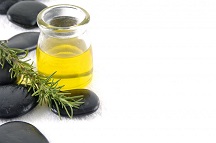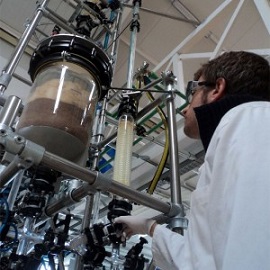At the World Bio Markets conference in Amsterdam, a presentation by Javier Velasco Álvarez of Neol Bio caught my attention. Neol Bio is a technology developer with a focus on microbial oils. Their current focus is to produce high value oils for the oleochemical sector from a wide range of biomass waste.

Chemicals from waste
Neol Bio is based in Granada, Spain. It is one of the many start-ups that have taken an interest in producing valuable chemicals from waste. Neol Bio stands out among these ventures by concentrating on the production of oleochemicals. Most competitors concentrate on short aliphatic molecules like ethanol or lactic acid; and aromatic molecules now tend to receive more attention. But Neol Bio is the only company to my knowledge that targets the production of oleochemicals from waste. The company’s website does not fail to mention that the global market for oleochemical products is about $ 30 billion per year with an estimated annual growth of 6%. So there is a world to win here.
There are two main families of oleochemicals: fatty acids and fatty alcohols, both widely used for production of surfactants, lubricants, biomaterials, cosmetics, etc. The oleochemicals market is currently dominated by Asian companies, which produce these compounds from vegetable oils (palm) using chemical methods. Neol Bio uses the oleaginous yeast Neoleum® to convert agricultural and industrial waste into oils, fatty acids and fatty alcohols. In comparison to traditional methods, the Neol Bio process uses less energy and produces less contaminants. It is not dependent on geographic location or climate conditions, and it is not in competition with human food production. In other words, the process is extremely versatile. After the conference, I interviewed Mr. Velasco by email.

Neol Bio, a remarkable portfolio
You are a small company, employing some 30 staff. Do you regard yourself as a technology developer or do you have projects running that could end up in production sites? Or do you look for industrial partners to do actual production together?
‘Neol Bio is a technology developer with a focus on microbial oils. Neol Bio has developed Microbioil-1, a technology platform for microbial oils production from glycerin and lignocellulosic biomass. This platform will be exploited by means of sales of licenses or the use of the technology in future joint ventures with industrial companies. Our current focus is in high value oils for the oleochemical sector.’
‘The company also has projects related to microbial oils for advanced food applications, in particular the production of an omega-3 oil rich in docosahexaenoic acid (DHA, a fatty acid essential for the growth and functional development of the nervous system) by cultivation of microalgae selected in ecosystems from the Iberian Peninsula. In this case, the strategy is the direct commercialization of products manufactured with our own technology. Its production and commercialization will be carried out in collaboration with Antibióticos de León (Spain). Both companies signed an agreement for these purposes in October 2015.’
You have some remarkable processes in your portfolio. Moving from glycerin, obviously not an oil, or from biomass waste (that will be mostly sugars) to oils is remarkable. You mention on your site that part of the work is to couple the right feedstock to the right product. This could result in a very broad portfolio. Is this picture of your company correct?
‘Yes, our purpose is to have a very flexible platform for microbial oils production from waste raw materials. Our microbial strains are able to use this broad range of carbon sources and we now also have a library of variants producing oils with specific fatty acid profiles.’
Towards a chain of waste treatments
In your speech, you mentioned the ‘resistance to inhibitors’ of your processes. Can you please give me an example?
‘Yes, when we use crude glycerin that contains rests of methanol, salts, etc. that many microbes can’t use. When we use lignocellulosic sugars coming from for instance wheat straw, the process generates byproducts such as furfural, hydroxymethyl furfural, acetic acid, etc. Our microbes are able to work under these harsh conditions.’
Obviously, there are more processes to treat biomass waste. What does this hold in stock for the future? Will there be specific waste streams that will be used for specific products? Or could biomass waste undergo a chain of treatments, where for instance your company could tap in on the waste stream of another process, or vice versa? Can we envisage a future in which all biomass waste will be put to good use?
‘Our strategy is to have flexible microbes able to work with existing biomass waste generated with current processes. We have successfully tested waste biomass coming from several processes of second generation ethanol production. In my opinion in the future there will be a market for industrial sugars from waste biomass with defined specifications. These industrial raw material will be use by other companies for production of biochemicals, biopolymers or advanced biofuels.’
In short, there will be a lot of developments in waste treatment over the coming decades; and Neol Bio is bound to be part of them.

Great technology and article! Hopefully, this technology can help stop the alarming deforestation rate for palm oil production…
Lots of lignocellulosic fibres to process!
Will definitely look for more info…